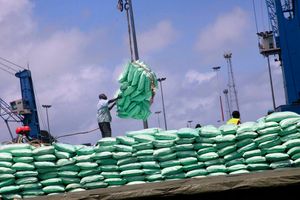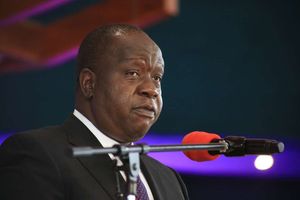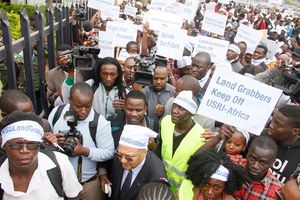
Parliament in session on November 9, 2023.
The National Assembly is fast becoming a House of Shame. Bribery allegations have become the order of the day. Once considered a congregation of patriots, it now resembles a den of crooks.
The bribery claims that rocked the parliamentary select committee which handled the impeachment motion against Agriculture Cabinet Secretary Mithika Linturi have joined the long list of graft allegations linked to House teams over the years.
Among hot button issues and committees that have stirred controversy are the contaminated sugar report, Ruaraka land saga, Building Bridges Initiative report, the 2015 Ababu Namwamba-led Public Accounts Committee and the Budget and Appropriation Committee chaired by Mutava Musyimi. In the Linturi case, it is alleged that some MPs were bribed with Sh5 million to save the CS.
The allegations have, however, been denied.
The bribery claims were raised on the floor of the House by Rarieda MP Otiende Amollo.
“I have interacted with some members of the select committee and a disclosure has been made to me that questions that allege impropriety and misconduct by some members of the committee were there. I am talking of something disclosed to me as a lawyer and a member of this House,” Dr Amollo said.
Mr Jack Wamboka, who was the sponsor of the motion, said: “Yes, there were allegations of bribery. My sister Omanyo was given Sh5 million but she declined and told them that the money will bring them cancer,” Mr Wamboka said in reference to the Busia Woman representative Caroline Omanyo, who also repeated the claims.
In 2018, bribery claims also rocked a joint committee on Agriculture and Trade that was investigating circumstances under which the government allowed uncontrolled importation of sugar in 2017 during a duty-free window. Some of the sugar was suspected to have been toxic or unfit for human consumption.
Also Read: I was tortured, starved by police, teary warehouse owner in condemned sugar scandal tells MPs
The joint committee co-chaired by then-Mandera South MP Adan Ali and his Kieni counterpart Kanini Kega had recommended that then-National Treasury Cabinet Secretary Henry Rotich, Industrialisation CS Adan Mohamed and Agriculture’s Willy Bett be held responsible.
Parliament rejected the report on grounds that the committee ignored its terms of references and did not take into consideration witness statements.
On the day of the debate of the report, there were claims that some MPs were bribed to reject it. The matter was referred to the Powers and Privileges Committee chaired by Speaker Justin Muturi.
Kimilili MP Didmas Barasa, while appearing before the committee, claimed that Fatuma Gedi, then-Wajir Woman Rep, tried to bribe him by approaching him with an envelope containing Sh10,000 to shoot down the report
“I saw Ms Gedi dishing out as little as Sh10,000. She even attempted to give me the money but I refused,” Mr Barasa told the committee. Matayos MP Geoffrey Odanga said he was approached by the then-Kuresoi South MP Joseph Tonui while he was having lunch at the restaurant.
“The Kuresoi South MP told me to go to a room and collect Sh20,000 to vote against the report,” Mr Odanga said. He, however, said that he did not take the money. The committee said that some members might have been involved in some forms of impropriety.
“There might have been bribery of Members of the National Assembly to reject the report on the importation of alleged illegal and contaminated sugar into the country,” stated the committee report.
“Based on the oral submissions by the witnesses, it is apparent that some Members may have been involved in some forms of impropriety.”
Ruaraka land
In 2018, another major scandal rocked Parliament after four members of the Senate County Public Accounts Committee were accused of soliciting Sh100 million from Francis Mburu in order to write a favourable report over a probe of Sh1.5 billion Ruaraka land.
Mr Mburu was reported to have recorded four senators of the committee who allegedly demanded the hefty bribe and handed the recordings to the Directorate of Criminal Investigations.
The Senate Powers and Privileges Committee took up the matter but did not investigate it fully, saying the affidavits by Mr Mburu, were submitted outside the period prescribed.
Further, the committee in its report tabled in November 2018, also said that Mr Mburu’s affidavits did not contain details that would form adequate ground for investigation.
“Arising from the foregoing, the Committee is unable to undertake an inquiry on its own motion envisaged under the provisions of Section 15 (5) of the Parliamentary Powers and Privileges Act as the affidavits, which were filed outside the timelines given by the Committee did not contain details that would form sufficient grounds to warrant such an inquiry as the allegations were unsubstantiated,” stated the committee report.
'BBI report bribe'
In 2021, then-Gatundu South MP Moses Kuria claimed that MPs were bribed to the tune of Sh100, 000 to pass a Constitution Amendment Bill, 2020 that was known as the BBI report.
“These things don’t happen on camera, and I don’t expect them to admit it, but they do happen in the majority leader’s office,” Mr Kuria said.
On May 14, 2021, Mr Kuria carried notes said to be worth Sh100,000 and displayed them on the floor of the House saying it was the money that was used to bribe MPs.
Civic awareness
More embarrassing to the House of honourable members was in 2015 when the Public Accounts Committee chaired by then-Budalang’i MP Namwamba was disbanded after it emerged that members were using their positions to enrich themselves through extortion.
The Namwamba team became the first watchdog committee in the history of Parliament to be disbanded on allegations of corruption. Among the major issues that sent the committee home was an allegation that former Defence Principal Secretary Mutea Iringo bribed them to have his name expunged from a report on corruption during his tenure at the Interior ministry.
Mr Iringo was also facing questions over the Sh2.8 billion in confidential expenditure under the Office of the President’s Vote in the 2012/2013 Accounts.
According to the report of the Powers and Privileges Committee that was chaired by former Kuresoi MP Moses Cheboi, it was established that a number of Members of the Public Accounts Committee as having breached the privileges accorded to them as MPs.
“The House resolves to rescind its resolutions of May 16, 2013 and October 8, 2013 on the appointment of Members to the Public Accounts Committee and requires the Committee on Selection to nominate, within seven days, for consideration by the House, another list of membership of the Public Accounts Committee,” stated the report onMarch 31, 2015.
During the inquiry, the report narrated how Mr Namwamba produced an audio recording as evidence how Mr Iringo met some members of the committee at a city hotel and gave them a bribe of Sh1.5 million, and promised to offer business opportunities at the Department of Defence with a view to compromising the work of the committee during the inquiry into the confidential expenditure by the Office of the President.
Fed up by numerous cases of misconduct of MPs, Speaker Muturi in 2019 issued tough guidelines, warning lawmakers against being too cosy with persons summoned by committees during investigations after the then-Majority Leader Aden Duale raised concern over the conduct of MPs in dealing with witnesses.
Among the tough guidelines issued by Mr Muturi was that no MP was allowed to escort a witness who appears before them after the meeting, a common practice to date where legislators see off witnesses — the point at which it is believed personal deals are cut.
Mr Muturi also warned MPs against using their privilege in committees to intimidate witnesses that appear before them.
“Members have to remember at all times that the aim of an interrogation is to bring out or reveal information relevant to the matter under consideration by the committee. Coercion, intimidation and embracing of witnesses rarely aids this objective,” Mr Muturi told MPs.
Centre for Multi-party Democracy (CMD-Kenya) Executive Director Franklin Mukhwana attributed corruption in Parliament to ‘black tax’ and societal expectations about the roles and image of an MP.
He said the society has been cultured to looks at political leaders as wealthy and generous hence shifting their attention from their core mandate of representation, oversight and legislation.
“If someone spends Sh100 million for campaign and his salary at the end of five years is Sh60 million, where do you think he gets the balance? Committees are then seen as sources of making money,” Mr Mukhwana said.
He said the problem can be fixed by conducting civic education about their roles and that of the elected leaders.
“There is need for civic awareness so that people can engage leaders on issues. Currently, the relationship between a politician and a voter is transactional,” Mr Mukhwana said.
Also Read: Silvanus Osoro claim of pumpkin soup to Azimio MPS to skip Finance Bill vote stirs new controversy
Public Accounts Committee Chairman John Mbadi said all arms of government are corrupt and Parliament cannot be singled out.
Mr Mbadi termed it a societal problem that can only be fixed through firm leadership from the President who must through commitment and actions deal with the vice.
“Corruption has permeated all arms of the government. We have had cases of judges in the Judiciary being bought.
The President must show leadership but I doubt if this regime is serious about corruption,” Mr Mbadi said.
Transparency International Kenya Executive Director Sheila Masinde said there is need to reorient members of Parliament on the Leadership and integrity provisions in the Constitution, the legislative framework on leadership and integrity.
She said the move will help regulate parliamentary behaviour and ethics standards, which are essential elements in securing public trust in the efficacy, transparency and equity of democratic systems, as well as to foster a culture of public service that favours public interest over private gains
In the long term, she said there should be a committee of ethics comprising of various actors including government agencies.
“Consideration of an ethics committee, akin to the Committee on Standards in Public Life under the Westminster parliamentary system model, comprising Members of Parliament from across the political divide, Citizens’ representatives and various representatives of government agencies,” Ms Masinde said.
In 2015, the Budget and Appropriations committee led by Mbeere North Mutava Musyimi (Mbeere North) faced disbandment after its members questioned the conduct of the chairman of rubber-stamping executive estimates and also holding secret meetings with President Uhuru Kenyatta.
The committee also attracted the wrath of the whole House following a revelation that its members had allocated Sh3 billion for their constituencies.











